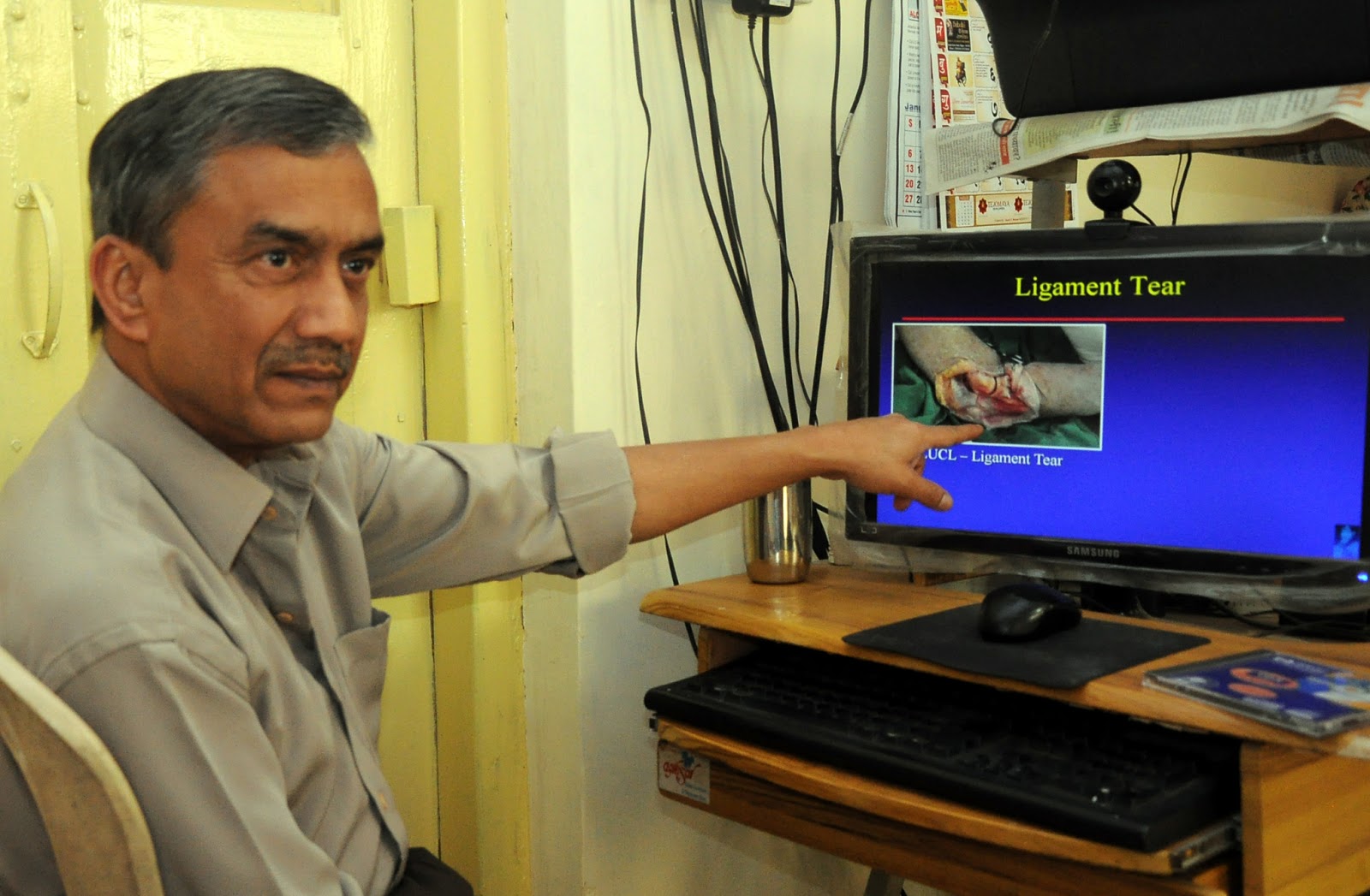Post-operative rehabilitation Management is important for the proper healing of injury
Shrikant Chinchalkar is explaining through the presentation, he has prepared that what a therapsist should know so that the injury can be rehabilitated after surgery.
Chinchalkar is showing about how the wrong movements are being done that can create severe problems in the injury.
In this presentation a man is seen at the fourth corner on the screen. He is renowned Orthopaedic Surgeon. He had suffered injury at elbow. Chinchalkar had conducted post operative rehabilitation management and now that Surgeon has recovered completely, can move his elbow as he used to do it earlier.
(Shrikant Chinchalkar can be contacted on "schinchalkar@hotmail"
28-2-2013
Post-operative rehabilitation Management is important for the proper healing of injury
Shrikant Chinchalkar is trying to spread this message throught the world
By Vikas Vaidya
He is internationally acclaimed Hand Therapist. He went to Canada in the year 1978 and developed four centres of postoperative rehabilitation there. He has over 35 years of clinical experience in treating upper extremity conditions.Presently he is working as Hand Therapist at the Hand and Upper Limb Centre, St. Joseph’s Health Centre in London, Ontario, Canada. He has conducted instructional courses at the Canadian, American, Australian, South African, South American, New Zealander and Asian Society of Hand Surgery and Hand Therapy. He has also been awarded the 2003 “Paul Brand Award of Excellence in Hand Therapy” and an “Award of Excellence” by the Sisters of St. Joseph’s Hospital in London, Ontario, Canada His papers and abstracts have been published in numerous peer reviewed journals related to Upper Extremity, Hand Surgery and Hand Therapy. Paul Brand himself had recommended his name for the award.
Shrikant Chinchalkar, is the product of Government Medical College, Nagpur. In an exclusive interview to The Hitavada, Chinchalkar said, “Postoperative rehabilitation is very important, but it lacks proper attention. I do not want to cast an aspersion on anybody, but rehabilitation part in India need to be improved. When any injury takes place, Orthopaedic Surgeon do the needful. In many cases the therapy is not advised or recommended in a casual manner. Patient tries to be in comfort zone and becomes too much cautious and do not make any movement of the treated part. Common complications that result because of prolonged immobilization include stiffness of hand joints, tendon adhesions and muscle weakness. Early controlled motion must be balanced with sufficient immobilization at areas of injury (ie, fractures and dislocations) to ensure that adequate healing occurs.” In postoperative rehabilitation management, patient’s cooperation plays an important role.
Chinchalkar completed his early education of Occupational Therapy from GMC in the year 1971. Before reaching Canada, he did one year volunteering at All India Institute of Medical Sciences (AIIMS), he also worked at Christian Medical College and Brown Memorial Medical College at Ludhiana. Before going to London; Ontario, Chinchalkar worked at Toronto General Hospital and Winnipeg Manitoba Health Science Centre. A very knowledgeable but modest Chinchalkar had to struggle to establish himself. Now his name has become a brand as far as postoperative rehabilitation is concerned.
“I got an opportunity to work with the stalwarts like Dr Salter, Manktelow, Mackinnion Roth, MacFarlane, Dr King. These people are great in their respective field. Some are from Orthopaedic Surgery department, some are Microvascular Surgeon etc. I learned so many things from them and that helped me in the longer run,” admitted Chinchalkar.
“The awareness about postoperative rehabilitation management was not there in 1971, when we completed our graduation. It was not being taught. That was absent in Canada too when I went there. World over the awareness is coming but the improvement is needed in India. In Europe or other western countries, these things are taken seriously,” pointed Shrikant Chinchalkar.
Is Chinchalkar planning to come to India? He smiles and says, “My heart and soul is in India. I am rendering my services for India. I have taken initiative to form association of Hand Therapists and now it has grown up. For the last 10 years I have been coming to India for conducting workshops on postoperative rehabilitation management. I want to give what have earned over the period of years to my country. I may or may not come but I sensed my country always.”





Comments
Post a Comment